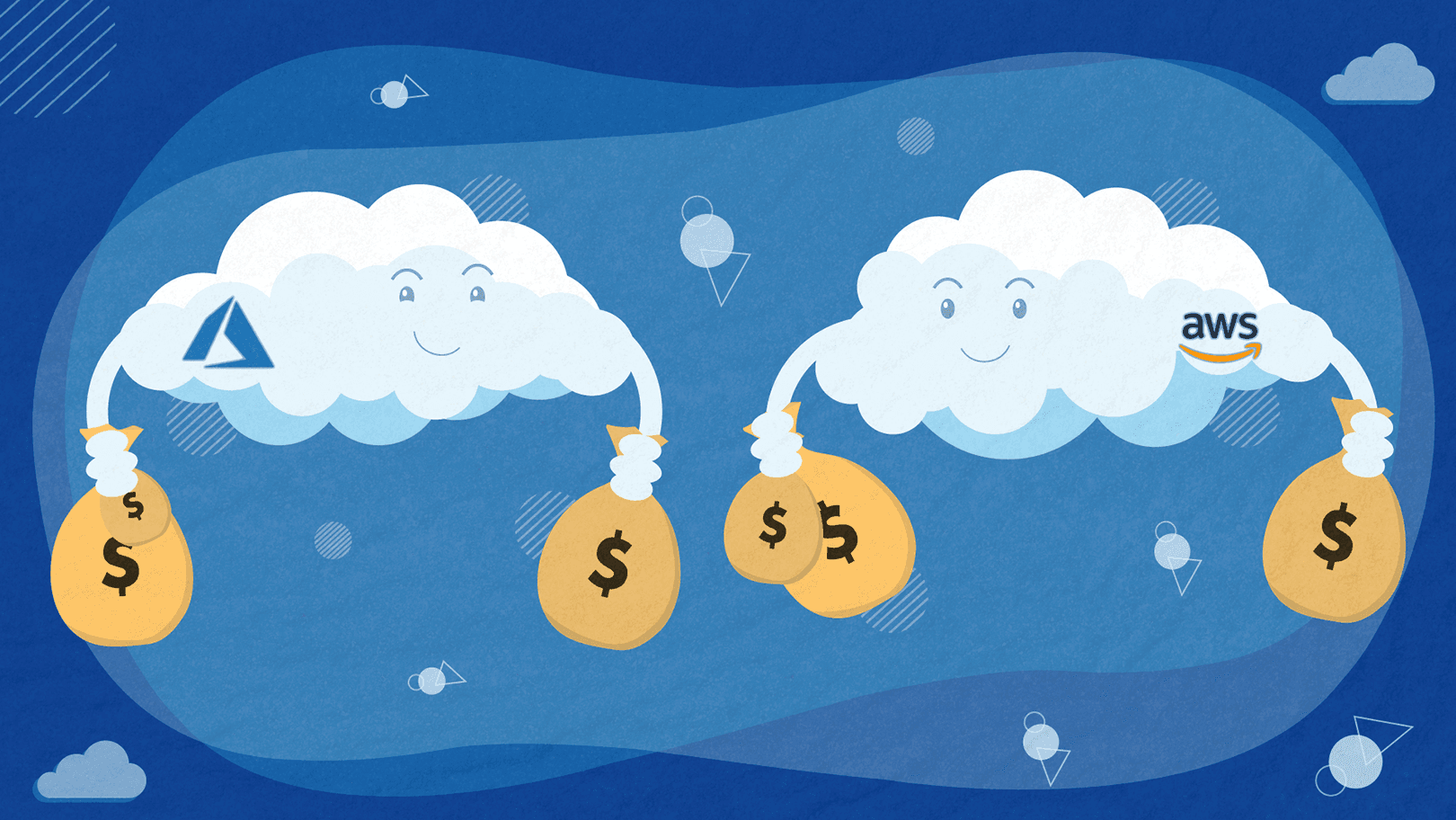Azure vs AWS: Pros and Cons List

Nowadays, cloud computing is a hot topic. This particular model that makes resources (e.g. virtual machines, applications, storage) available to users remotely, has become a must-have for businesses that are looking to cut down costs and increase flexibility.
However, even though everyone is thinking about relocating to cloud, for most business professionals this is still a mystery box. As they proceed to inform themselves about transferring their business to this environment, businesses start to acknowledge that the cloud is not a single entity where you can just dump all your data.
There are usually three models of cloud service (SaaS, PaaS, IaaS) to compare and every single one of them brings different benefits and variances. It’s important to understand the pros and cons of each of them in order to successfully choose the best one for your operation.
Today, we will not compare these different types of service, but rather look at the two most powerful providers in the cloud industry: Azure and AWS.
But, before we jump into that, let’s see what’s the big fuss about cloud anyway.
TL;DR: Understanding Cloud Computing
Cloud computing is the platform of choice in today's world of Big Data and Data Science. Before deciding to move to a cloud-based environment, it’s of great importance to first learn about all possible options and find the best possible provider.
As you’ll figure out by yourself once you start to read more on this subject, finding the best provider won’t be an easy task. In majority of cases, every provider offers the same things. The challenging part revolves around finding a platform that best meets your business requirements.
For example, if you run a company that ends up needing a strong Platform-as-a-service (PaaS) provider or some kind of Windows integration - you should go with Azure. However, in case your enterprise-level company needs an IaaS platform (infrastructure-as-a-service) or a diverse set of tools - then you might want to consider siding with AWS.
This is of course, very simplified. It is just the tip of the iceberg. There are tons of details you’ll need to know in order to successfully move to the cloud. More recently, a parameter for making this decision includes the amount of built-in analytics tools available on each of the potential platforms. Since this is not a simple process that most business professionals can accomplish without proper education, we at Share IT have decided to compare two of the biggest cloud providers AWS and Azure, and help you decide which one is best for you.
General Overview

Amazon Web Services, a.k.a. AWS, is a cloud service platform created and managed by Amazon. It was launched in 2006 and is considered to be the ultimate cloud platform. According to the website ParkMyCloud, with an increase of 49% in sales in the last 12 months, AWS has solidified its position as the global market share leader in cloud computing. It has been reported that AWS revenue now makes up a whopping 13% of total Amazon sales.
Just like AWS, Azure is also owned and managed by a big and powerful company. This cloud service provider was launched in 2010 by Microsoft. Even though it came rather late into the game, Azure quickly became one of the biggest commercial providers on the market. Thanks to its wide array of tools and toys, Azure became interesting to IT users in record time.
Both of these brands operate in the same field. However, Azure services are a bit different than AWS’. Regardless of the fact that these two are often compared to each other, Azure has a different cloud business. This platform offers not only Azure, but also Office 365, Dynamics 365, and other segments of the Productivity and Business Processes Division. It gives the user a wide range of integrated cloud services and functionalities such as analytics, computing, networking, database, storage, mobile and web applications that seamlessly integrate with their environment, allowing users to achieve efficiency and scalability.
Microsoft reported that they are doing quite well with Azure. ParkMyCloud claims that Microsoft’s Azure grew 41% in revenue in the first three months of 2019. Supposedly, analysts say that Azure is growing at a faster rate than AWS when it was at a similar size. You could say that Azure steadily grown into a more than worthy rival of AWS, even though AWS still sits on the throne of the cloud computing world.
Azure vs. AWS: Computing
AWS uses Elastic Compute Cloud (EC2) as a primary solution for scalable computing. These instances can be tailored with a great number of options. In addition to this, AWS provides related services such as Elastic Beanstalk for app deployment, the EC2 Container service, AWS Lambda and Autoscaling.
Microsoft’s Azure operates on a different principle. For computing purposes, Azure relies on VHDs (Virtual Hard Disks) to create virtual machines (VMs). Google's Compute Engine delivers these VMs in Google's data centres. These disks can be pre-configured by Microsoft, the user, or a third party. The user is obligated to specify the number of cores and the amount of memory. Everything is highly customizable depending on the needs of the customer.
Even though both options are excellent, AWS can be seen as a better option for beginners. Firstly, it has a vast tool set. Secondly, it allows users to use their own VMS or pre-configured images.
With Azure, it’s quite different and there are more steps that need to be taken. Users first have to select the VHD to create a VM which is pre-configured by the third party. In addition to that, as mentioned above, they are also obliged to specify the number of cores and memory.
Azure vs. AWS: Storage

As for the storage capabilities, AWS is the name in which a lot of companies place their trust in, but Azure has also proven to be quite reliable. Since AWS is the longest running storage on the market, it contains the largest library of tutorials. From a total noobs’ perspective, this makes AWS a clear winner in this category.
Both providers are quite strong in this field and have all the standard features such as REST API and server-side data encryption. Azure’s storage system is known simply as Blob, while Amazon has named theirs as Simple Storage Service (S3).
AWS' cloud ensures high data availability. Due to its automatic replication of the data across regions, it serves as a great disaster recovery solution. Once the instance starts, the temporary storage starts functioning. The moment the instance terminates, temporary storage stops working. Here, block storage can be kept separate or tied to any EC2 instance.
On the other hand, Azure relies on temporary storage and page blobs for VM based volumes. If you compare the two provides, you could say that the Azure's Block Storage option works similarly to AWS' S3. Azure also offers two different types of storage, Hot and Cool. Hot is more expensive and therefore more comprehensive, while Cool is a cheaper option.
Azure vs. AWS: Databases
Needless to say, databases are crucial. All software applications require databases to save information. Both Azure and AWS provide database services, regardless of whether you need a relational database or a NoSQL offering.
AWS works like a clock with NoSQL and relational databases. It provides a respectable environment for big data. AWS’ core analytics offering EMR (a managed Hadoop, Spark and Presto solution) helps set up an EC2 cluster and provides integration with various AWS services.
Azure is also good with NoSQL and relational databases. Azure HDInsight and Azure Table are definitely great in this context. In addition, Azure provides analytical products through its exclusive Cortana Intelligence Suite that comes with Hadoop, Spark, Storm, and HBase.
In terms of RDS and the supported database engines, AWS can be based on MySQL, Microsoft SQL, PostgreSQL, Oracle, Amazon Aurora, and Maria DB. On the other hand, the database service of Azure is based only on MS SQL server. Azure is probably simpler and more user-friendly since its interface allows many different operations. AWS on the other hand, has more instance types, allowing the user greater control over DB instances.
Azure vs. AWS: Flexibility and Pricing

Most companies now require a hybrid cloud environment that combines the elements of a on-premises infrastructure, private cloud environment, and a third-party public cloud. This lets them maneuver between the two platforms.
Flexibility is probably the only category on this list where we have a clear winner. Azure is open to hybrid cloud systems, while AWS is not. The Amazon-owned provider is in general less open to private or third-party cloud providers, making Azure a clearly better option for users who are looking for a hybrid cloud.
Azure has a very solid cloud infrastructure which shouldn’t surprise us. Microsoft has experience with enterprises and knows the importance of data centers to them. That's why Azure offers great flexibility and data deployment options to its customers.
Pricing is another field where Azure takes the win. While AWS regularly lowers its prices, many customers find it quite hard to figure out AWS' cost structure. These same customers experience great difficulty managing these costs effectively when they run many workloads on the service.
The costs of extracting data and files once they are in AWS’s storage control is also an issue. Even though the company tries to be as transparent as possible when it comes to things they charge for, most users don’t educate themselves beforehand so they end up spending more money than they need to.
The pricing situation often outweighs all AWS’ strengths for most clients.
Closing Words
Thank you for taking the time to read this article in its entirety. We at Share IT sincerely hope it acquainted you better with AWS and Azure cloud services. As you can see from everything written above, it’s not quite that easy to point at one of the two options and declare it as a clear winner. Both providers offer great services that work differently for different businesses with different requirements.
If you’re not quite sure what would be the best and cost-efficient cloud solution for your company, contact us for a consultancy and let us help you migrate to cloud the right way.